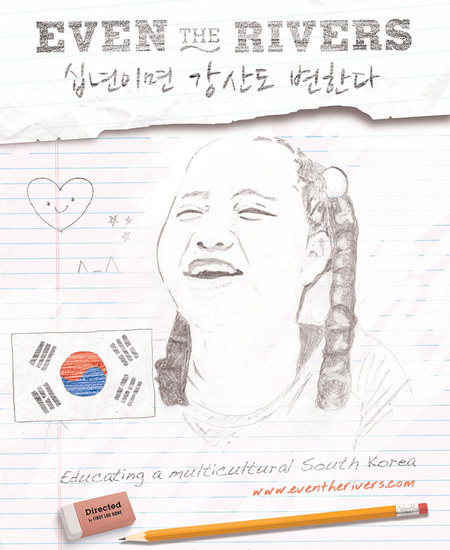- California Assembly OKs highest minimum wage in nation
- S. Korea unveils first graphic cigarette warnings
- US joins with South Korea, Japan in bid to deter North Korea
- LPGA golfer Chun In-gee finally back in action
- S. Korea won’t be top seed in final World Cup qualification round
- US men’s soccer misses 2nd straight Olympics
- US back on track in qualifying with 4-0 win over Guatemala
- High-intensity workout injuries spawn cottage industry
- CDC expands range of Zika mosquitoes into parts of Northeast
- Who knew? ‘The Walking Dead’ is helping families connect
Film examines realities of multi-ethnic youth

The upcoming documentary “Even the Rivers” examines the growing multi-cultural community in Korea. (Korea Times)
By Do Je-hae
U.S. director Cindy Lou Howe has launched an online campaign for the film “Even the Rivers,’’ a documentary that examines the reality of multi-cultural communities in Korea.
The 30-day campaign was launched Monday on the popular crowd-funding website Kickstarter. Named after a Korean proverb about the inevitability of change, “Even the Rivers’’ addresses some of the major issues faced by multi-ethnic youth in schools. The film is set to be released in early 2014.
“More than a fundraiser, our goal is to raise awareness about a changing Korea and to help the country plan for a multi-cultural future,’’ said Howe in a press release.
Born to a Korean mother and African-American father, Howe returned to Korea in 2008 and founded an education program for multi-ethnic youth.
”I began presenting on this topic at various academic conferences in the U.S. and Korea. I found that people were very interested in Korea’s growing multicultural awareness and how schools were handling this more diverse student population. Through my lectures I noticed that the voices of the actual people that are doing the work with the multicultural population were absent. As a result, I decided to create a film,’’ Howe said.
To better understand the issue, Howe interviewed parents, educators, social activists and multi-ethnic Koreans over two years. “Even the Rivers’’ highlights how government policies ― from more inclusive curriculum to segregating multi-ethnic students ― are simultaneously helping and hurting multi-ethnic youth.
The film ultimately aims to inspire people to assist Korea in negotiating a complex and difficult path to multiculturalism.
A dramatic demographic change is most obvious in the nation’s schools, where the number of multi-ethnic students has increased 600 percent since 2006.
Some reports show that Korean schools have not been receptive toward such a change. A 2010 survey by the National Human Rights Commission found that 41.9 percent were taunted by classmates because of their accents; 36 percent said their peers looked down on them due to their mother countries; 25.3 percent said they were insulted for their appearance; 21 percent were told to leave Korea; and 15.1 percent were beaten by peers.
“These numbers suggest there’s a real urgency in addressing school bullying and general attitudes,’’ Howe said. “Creating real anti-discrimination laws applicable in the workplace, schools and society in general to protect multicultural families would be great a start.’’
For more information, visit www.eventherivers.com and online fundraising campaign through Kickstarter.











